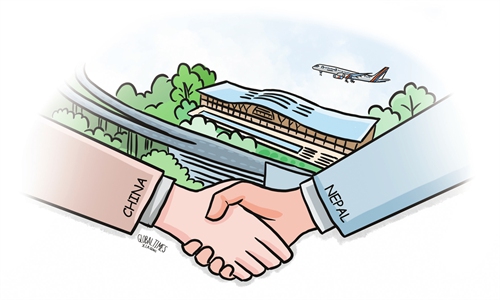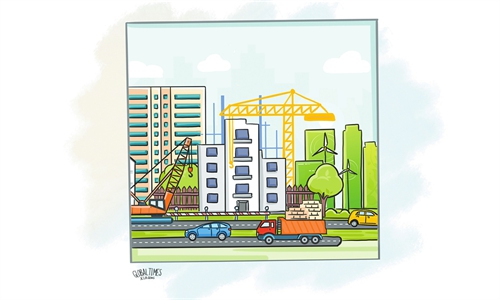
Illustration: Liu Xiangya/GT
Nepali Prime Minister KP Sharma Oli paid an official visit to China this week, during which he signed a number of documents with the Chinese side to promote bilateral cooperation on economy, technology and trade. Some Western media outlets have given "special attention" to Oli's China visit and tried to use it to provoke a geopolitical struggle between China and India. Their hype of the "pressure" on South Asian countries to "take sides" did not make any waves.Meanwhile, when addressing the Indian Parliament on Tuesday, Indian External Affairs Minister Subrahmanyam Jaishankar said the resolutions with China on issues concerning the border area allow the two countries to "consider other aspects of our bilateral engagement in a calibrated manner." All of this reflects that the people of the South Asian countries are showing a very clear attitude of wanting development and cooperation rather than geopolitical strife.
First, the West's geopolitical game of "divide and rule" has now become unpopular in South Asia. The current territorial disputes between some countries in the region are basically the "liabilities" left behind by the Western colonizers in the past. Now, the West continues to use issues, such as territorial disputes and regional competition, to provoke relations between China, India and other regional countries. Despite this, the people of South Asian countries have become more sober, with more calls to seek strategic autonomy, focus on development and cooperation, create a stable neighborhood and refuse to let their countries become a playground of geopolitical games.
Second, economic development and win-win cooperation are still the broadest common ground of South Asian countries. Under internal and external pressures, South Asian countries have demonstrated a strong will to break away from disruption and focus on development. New Delhi has taken the opportunity of the easing of China-India border tensions to continuously release signals to improve economic and trade cooperation with Beijing. Other South Asian countries have also been "looking east" amid synchronized development of relations with neighboring countries.
Third, the improvement of bilateral relations between China and India is good news for both countries as well as the entire region. Development is the broadest common ground between the two countries. Only by viewing and handling bilateral relations from a strategic and long-term perspective and preventing specific differences from affecting the overall development of bilateral ties can China and India create favorable conditions for the improvement and development of their relationship. In doing so, this will make a greater contribution to regional and world peace and prosperity, and promote multipolarity in the world.
Recently, China-India relations have shown increasing signs of improvement, with the gradual resumption of people-to-people exchanges and other pragmatic cooperation. Of course, this momentum needs to be consolidated and promoted through joint efforts from both sides. All the recent changes show that cooperation rather than confrontation is still highly in the interest of China and India and their people. To this end, the two countries need to continuously consolidate the consensus on mutual development and win-win cooperation.
In general, South Asian countries are eager for economic development and improvement of their people's livelihood. As the world's two largest developing countries and the two major neighbors of South Asian countries, China and India have the responsibility to drive the region to focus on development and cooperation, adhere to strategic autonomy and jointly resist all kinds of external provocation and "divide and rule" efforts. In this way, more consensus and strength can be built up for the unity and cooperation of the "Global South," including countries in South Asia, and more "positive energy" can be injected into the promotion of multipolarity in the world, economic globalization and the democratization of international relations.
The author is the director of the Department of Asia-Pacific Studies at China Institute of International Studies. opinion@globaltimes.com.cn


